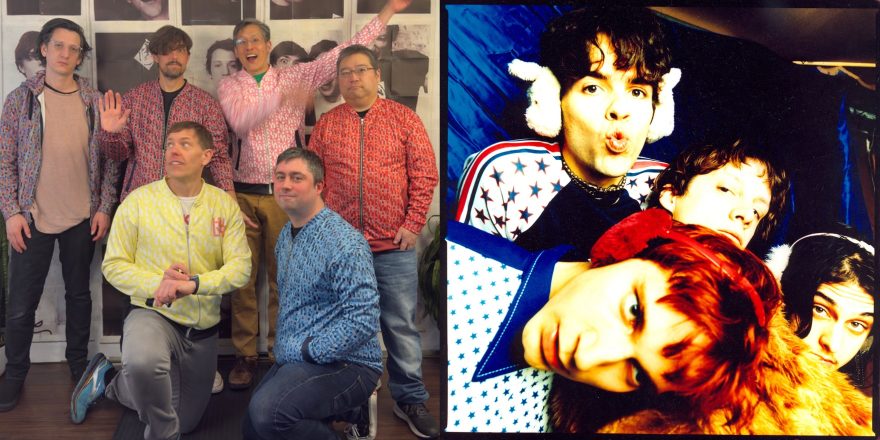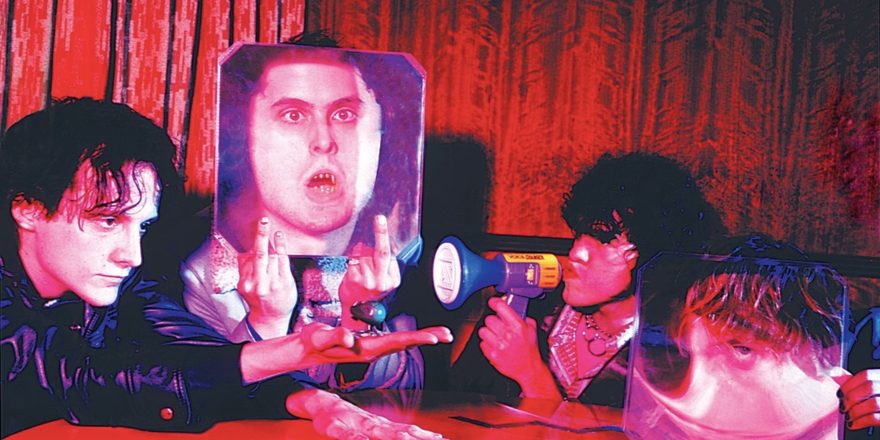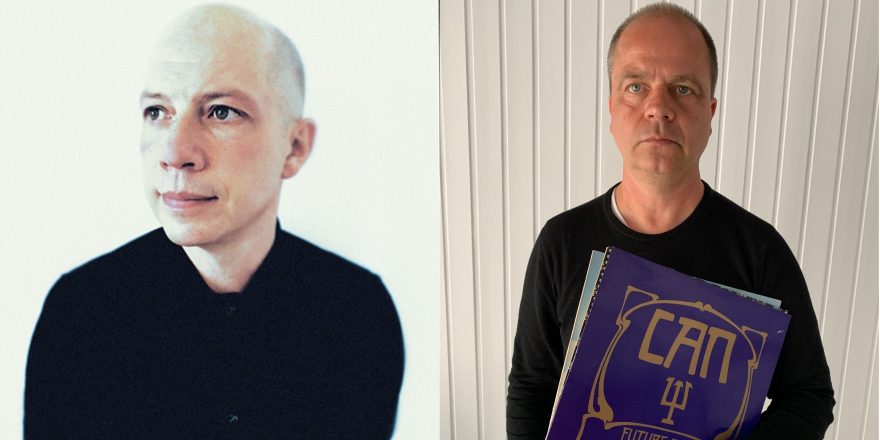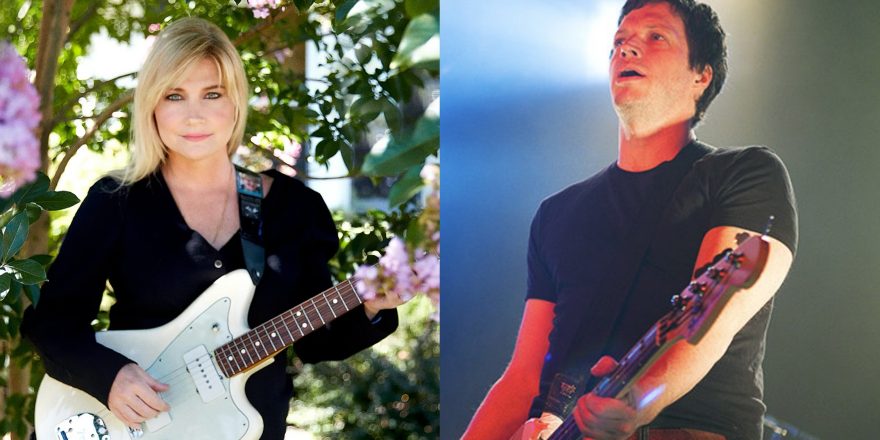Tim Byron was a founding member of the LA band The Mae Shi, and now plays in a reunited version of the group, called HLLLYH (after The Mae Shi’s critically acclaimed 2008 record); Tyler Trent is the drummer for the legendary experimental band Brainiac, and a pastor in Dayton, Ohio. HLLLYH’s debut record, URUBURU, just came out last week, so to celebrate, Tim and Tyler got on a Zoom call to catch up about it.
— Annie Fell, Editor-in-chief, Talkhouse Music
Tim Byron: Hi, Tyler.
Tyler Trent: Hi, Tim.
Tim: How are you doing?
Tyler: I’m really good. How are you doing?
Tim: I’m doing pretty well. Thanks for being willing to do this with me. I told you this back in January when our bands played together, but I’ll just say it again: Brainiac is a huge influential band for me. You know how you have those bands where you remember where you were the first time you heard them? I totally remember the first time I heard Brainiac. It was “Go Freaks Go,” my friend played it for me — he had a zine. And when I decided I needed to start a band in 2001, basically the first idea was, “Let’s just be Brainiac.”
Tyler: [Laughs.]
Tim: So that’s how we got started, like, “Let’s just evolve from there.” It’s awesome to get to know you and get a chance to talk with you.
Tyler: Yeah. Speaking of January — I mean, since 1992, Brainiac’s played hundreds of shows, literally, and that show is up there.
Tim: Oh, wow.
Tyler: It was just so good and so much fun, and you guys were incredible. We didn’t know what to expect — the whole tour, actually, was funny because John [Schmersal] warned us, as a Californian, how California acts for pre-sales and stuff like that. So that show was like, “Is anyone going to come? Is this really going to happen?” Then we showed up and that was the most gracious crowd, and so wild and just full of life and energy. We had an absolute blast. So thanks for doing that.
Tim: Oh, yeah. It was really cool how there were, like, 40 and 50 year olds in the crowd, but there were also these 20 year olds that were going crazy.
Tyler: Yes, violating the “no stage diving” sign.
Tim: Again and again and again, and stepping on John’s pedals.
Tyler: That’s been a really amazing part of this current journey that Brainiac’s on the last couple years. We’re seeing old friends and old faces and people my age that want to hear the music from back in the day. But we’re also seeing a lot of young kids show up who discovered us on Spotify or by word of mouth or whatever. We don’t take for granted that these young faces are discovering us.
Tim: That’s awesome. I think that’s happened to a lot of bands from the ‘90s, the 2000s — people are rediscovering them. But I think with you guys, Brainiac was always ahead of its time. At least, that’s the way I saw it. Without Brainiac, there wouldn’t be a Mae Shi, there wouldn’t be bands like Les Savy Fav or At the Drive-In or Mars Volta. Even Beck or Nine Inch Nails, I think they’d probably sound a little different if it weren’t for Brainiac. Do you agree with the premise that you guys were ahead of your time? And if so, was there a point where you noticed it?
Tyler: Yeah, I think we can acknowledge that. And I think for me personally, it’s OK to acknowledge that, because I experienced that individually when I tried out for the band. When I went down to Tim Taylor’s basement and he played me a couple songs to give me an idea of what kind of drum part to use, the second I heard it, that’s what I thought. What is this? This is wild. So, in a weird way, I became a fan of the music right on the spot before I was even in the band.
Tim: I know that Tim was the primary songwriter, but how did the songwriting process go with Brainiac?
Tyler: Yeah, Tim was the primary songwriter. John brought some stuff, too, to the table. He had a song on Bonsai [Superstar]. And then he was really involved in the Electro-Shock EP, with that whole shift with the electronic stuff. And John’s just — as we know from Enon and Scratchers and everything he does — such a gifted songwriter and talent himself. So Tim Taylor was the juice, and he would bring the ideas and the songs, but there was also a collaborative effort with myself and Juan [Monasterio] and John as the songs took shape.
If you’ve seen the documentary, there’s a funny little bit where Juan and I say the exact same thing across the country being interviewed: Tim would bring this idea to practice, and it was like this golden pop hit. And then he’d slowly deconstruct it into a Brainiac song. But for a minute, you’d be like, Oh, my gosh, is this going to be Top 40 radio? But he had to Brainiac-ize it. Which looking back, it shouldn’t have been any other way.
Tim: I saw the documentary — I actually flew down to see it in downtown LA, and that show that you played with all those special guests, like Fred Armisen.
Our band, sometimes we would figure out songs in the practice space, and they’d become live songs and then we’d record them. And then there were songs that we would record first and then learn to play live. How did it work with you guys?
Tyler: He’d bring the song ideas to practice, but our practices were basically live performances. I mean, we just couldn’t turn it off. We had the same energy and chaos. Things would get broken. We were always in the process of what that would look like in the live show. I think the music lent itself to that as well — we’d just get so excited and so into it. I remember there being practices where I’d break so many drumsticks, I’d have to find a hammer or something close by just to serve as a strike to hit the drums.
Tim: That’s cool. Listening to Bonsai Superstar — I don’t know the names of all your songs, because I feel like with Brainiac, I would just put on a record and then it would end. I’d listen to the whole thing. But the song on Bonsai Superstar with the samples from the, “how to train your parrot”—
Tyler: Oh, yeah. That one’s called “Fucking With the Altimiter.”
Tim: [Laughs.] Was that a live song before it was recorded?
Tyler: No. This isn’t any sort of self-deprecating thing, but a lot of my favorite Brainiac songs I have nothing to do with, and that’s maybe my favorite song. It’s just so beautiful and so brilliant. The lyrics are insane, just off the charts amazing. He just would show up with a demo and play it for us, and then he’d send that demo to [the producer] Eli Janney. I remember Eli freaking out over it. Then he tweaked it a little bit for what was the end product. But that was pretty much just Tim. I feel the same way about a song called “Strung” on Hissing Prigs. It’s just so beautiful and so bizarre and haunting and moving. [I had] nothing to do with that one. In the current Brainiac, we tried that a couple times live, which was interesting. But I don’t think we ever did that back in the ‘90s. “Collide” is another one, the last song on Bonsai Superstar. Just gorgeous… I get to kind of sit back and appreciate it myself.
Tim: Yeah, I can definitely relate. There are songs that our band did that I had nothing to do with that I’m super proud of, that I feel ownership of even if I didn’t really have anything to do with them.
So, I know you as the drummer in one of my favorite bands, but by day, you’re a pastor, right?
Tyler: I am, yeah. I’m a pastor right here in Dayton.
Tim: I was in a band that made this record that people kind of think of as a concept record about Christianity [The Mae Shi’s 2008 record HLLLYH]. So I guess we could talk about faith a little bit. What do you think?
Tyler: Sure. And that’s one of my favorite records of all time. I love that record so much.
Tim: You said that in January, and I like hearing it again. [Laughs.]
Tyler: It’s so good. It’s chaotic. It’s melodic. I forget how, but I remember I came across it when it came out, and I worked a day job, computer kind of gig. They let us listen to stuff, and I would just listen to it all the time. Was it on vinyl ever?
Tim: Yeah, it was. It had to be a three-sided record because it was 50 minutes long or something, so there’s one side that’s just blank… But do you want to share something about how you ended up on this path?
Tyler: I grew up in the church that I actually pastor at. I was always playing in bands in junior high school. I had a best friend named Jeremy, and we did a talent show together, I think in seventh grade. We were called The Dueling Drummers, and I would play a beat, and he would play the beat, and then we would play together, and we did it, like, five times and that was the whole performance. I grew up in not a super musical family. I have a 22 year old boy, and in the past few years, he’s been teaching me all about, “Hey, dad, there’s this band called Black Sabbath. You should check them out.” I skipped that whole thing — I just went straight from growing up in church music to punk rock. I met Jeremy in seventh grade, and just instantly: Dead Kennedys and Circle Jerks and Agent Orange. And then I got super huge into The Cure. All that music and all those amazing music scenes that were happening — including where you are, San Francisco — we were so fascinated by that. We had Maximum Rocknroll subscriptions, Jeremy would write all over the country to people back-and-forth, pen pals.
In eighth grade, we had a garage band called Sunken Giraffe, then in ninth grade, there would be this kid moving to town from Vineland, New Jersey, named John Schmersal, and he would join that band. We eventually had some original stuff, but we did lots of Misfits covers…
Tenth grade rolled around, and I started thinking about, What am I going to do with my life? I got back into the groove of my church life and the youth group, and I played drums there. I thought about being a pastor even way back then. But I ended up just going to community college to become a teacher. And that’s when Jeremy introduced me to Tim and Juan. He was in a band at the time with John called Tribal Nation, and he invited me to this warehouse show. The Dayton music scene was so electric and on fire at the time. I walked into that warehouse and I was like, Oh, man, I miss this. So I started going to shows, and [Jeremy] was like, “Hey, these guys are pretty cool. They’re looking for a drummer.” He introduced me, and that was how I tried out for Brainiac.
That whole Brainiac thing happened from ‘92 to ‘97. And then when Tim died, that was obviously devastating. It wrecked us completely. At first, you mourn the loss of your friend, your brother, your companion in rock. And then as time goes on, you realize that Brainiac’s dead, too. And throughout Brainiac, I was a pretty intense recreational drug user. So when Tim died, that recreational drug use just spiraled. And that was ‘97 to 2007 — about a solid decade of, more or less, just destroying myself. So 2007 rolled along and I was totally hopeless. Tail between my legs, I went back to my childhood church — I remember it was Palm Sunday — and something happened that day. Grace just flooded me, and I’ve been changed ever since. It was slow. I just hung out, started going to church, then volunteered, cleaning up stuff, outreach, whatever. And that began a journey over a couple of years of getting more and more involved, and then really feeling that tug from back in the late ‘80s, like, Oh, maybe this is something I really want to do. I really started studying the scriptures and immersing myself in all that. That was a long journey to several years later, 2020, the church that I’m at ordained me. So that’s how it all came about.
Tim: I’m curious if there’s any surprising overlaps between being in a spazzy punk rock band and being a pastor. Obviously they’re different, but are they the same in any ways?
Tyler: To me, they’re inseparable. That’s one of the things about my faith: I find them inseparable.This is who I am. I’m that punk rock drummer who stands on top of his kick drum and screams ‘til his voice is gone, and then I’m also a pastor. I just love people, and I love loving on people in whatever context I’m in. Sometimes that’s a punk rock show, and sometimes that’s on Sunday morning, and sometimes that’s at a dinner table or a bar or wherever. For me, I don’t see any conflict.
Tim: That’s awesome. At your church, do they know about your musical past? And how do they respond to it?
Tyler: They do. My lead pastor and boss, his name is Jeff Wilson, he’s awesome. He’s a musician too, and he loves it. He’s like my biggest fan. He’s one of the people that said, “Just go for it,” with all this current stuff. Because I gotta take time off work. Just like any other job, you’ve got vacation days, so we try to fit it in. And they give me a little extra time too. They’re excited about it. And like any other church or business or family, maybe not everybody understands it, but for the most part, they’re super supportive and excited. I mean, I got to go to the UK with Mogwai! How cool is that?
Tim: Super cool. Is that tour over now?
Tyler: Yeah. There were a couple of catalysts — one, in 2018, was our friend Eric Mahoney saying he wanted to make a documentary. So it got John and Juan and I talking again. Which, it’s a shame that we weren’t, but other than little things here and there, we just all drifted our separate ways after Tim died. So that got us back in the room, and we remembered how much we loved each other and how much we loved the music. And it reminded us, too, that other people still love the music. So we started doing these little one-off shows, like you said in 2019 with Fred Armisen. But in 2023, because John’s the touring bass player for Caribou, and they were at a festival, Stuart [Braithwaite] from Mogwai — who were huge fans of the band. I mean, they opened up for us in the late ‘90s in Scotland.
Tim: Crazy.
Tyler: He floated the idea to John like, “Hey, what would you guys think of coming and supporting us?” So that was the next phase, where we had to sit down like, “Alright, are we going to really do this a band?” And that involved asking a lot of tough questions like: can you do this without Tim Taylor? Are we physically capable of doing this in our 50s now? And, once again, do other people want this? The more we talked to people — including Tim’s mom, who’s our biggest fan and supporter — I mean, we can’t get her to stop buying tickets to shows, t-shirts, hats. We’re like, “Linda, we’ll get you into the show! We’ll give you a t-shirt!” [Laughs.] But we realized that the answer to all those questions was more or less a resounding “yes.” So that tour kicked us back into band gear. And it also just about killed us. It was two weeks in the UK, and all that travel during the winter with flu bugs… But it was incredible. And we were back on stage with the help of our amazing friend Tim Krug, who’s just a gift. We were back to being kind of a cohesive band.
Since then, we’ve done a Midwest tour, a West Coast tour, played with you. We just did an East Coast tour, two weeks with Mogwai again, playing in these amazing rooms — some bucket list rooms we never got to do back in the day, like 9:30 Club in DC. So, yeah, we’re doing it.
Tim: That’s awesome. I’ve known Tim Krug since 2007 or something like that, because one of his bands played with Mae Shi in Cleveland or Dayton.
Tyler: Was it Human Reunion?
Tim: It was Human Reunion, I think.
Tyler: That’s my friend Jeremy [Frederick] from junior high school!
Tim: Oh, my gosh!
Tyler: That’s the crazy lunatic frontman.
Tim: And he passed away, right?
Tyler: He did, yep. He’s kind of that common glue to all these stories and bands. It’s pretty incredible. Don’t you love our giant tiny universe?
Tim: It’s very cool.
Tyler: And their record, Arc de Square — which is incredible — John Schmersal recorded that.
Tim: What a small world.
Tyler: Well, I’d like to talk about you and your musical history. Were you always in San Francisco?
Tim: No, we were a Los Angeles band. That’s where we grew up.
Tyler: Oh, OK. So what was that like, that scene?
Tim: Growing up in Los Angeles was really cool because there were these all ages clubs, like the Jabberjaw. You played there, right?
Tyler: At least twice. The best club ever.
Tim: I have a poster from you guys playing with the Melvins there. But there were these all ages clubs. And you mentioned The Cure — bands like The Cure and The Smiths and Depeche Mode, they were from the UK, but they were almost like LA bands, because KROQ would play them non-stop. So when The Cure would go on tour, it’d be one show in Seattle, one show in Portland, one show in San Francisco, and then, like, eight shows in LA. So The Cure and Depeche Mode were like the bands that my babysitters were into. Getting to listen to all that good music was very cool. And every band comes to LA, so you can see all the different bands.
I guess in 2001 or 2002, after going to a lot of shows, I was like, I want to be a part of this. I want to open for bands at The Smell. The Smell was the local all ages club that was around at the time, and that was all I wanted to do. My friend Ezra [Buchla] had dropped out of college and was back in LA. He was this interesting, strange, sort of genius guy, the kind of nerdy guy that gets 1600 on his SATs but goes to Oberlin to study viola. I was like, “I think you’d be a really good singer. Let’s start this band.” So we did that. And then my brother [Jeff Byron] graduated from college and joined. So there was two brothers and Ezra.
It’s interesting, the Bible and Christianity has always been part of our music, but Ezra and Jeff and I were raised secularly. We were Los Angeles kids. But it was right after 9/11, so it was this time when you were hearing a lot about “militant Islam” and everyone was trying to build support for this war in Iraq, war in Afghanistan, war against these Islamic countries. You’d watch CNN and someone would be finding some passage in the Quran that was scary and not in line with Western beliefs. So we started looking through the Bible and were like, “There’s some really weird stuff in the Bible.”
Tyler: Yep!
Tim: We were looking through the Book of Judges, which is just this crazy story that keeps repeating. God tells the Israelites, “Don’t do this,” and then they do it and he punishes them. And then it happens again and again and again. So the thought was, “Let’s use this as source material. Let’s not pass judgment either way, let’s just write songs about the Old Testament or Revelation.” Revelation is basically like a monster movie, right? The seven seals and the seven trumpets — it’s very cinematic. So it was like, “We’re not believers, but let’s just put it out there and see how people respond to it.” But then our drummer joined, Brad [Breeck], and he was from the Midwest, and like you grew up playing drums in a church band. So he brought a different aspect to the band, which was this sort of refugee from the Midwest living in LA, kind of struggling with his faith, on the outside but having been on the inside. And then before that HLLLYH record came out, we changed singers. Our friend John [Gray] joined the band, and we found out after that he was even more Christian. He was homeschooled, and unlike the rest of us, he still very much believed in it. So we went into that record all having these different views, and it was like, “Why don’t we just put them all out here and see how it congeals?” So it ended up being this album that’s about Christianity and our all of our different experiences with it.
I think at the time, people started to think that we were Christian rock, or Christian indie. We were cool with that because it was like, “If it means that some kid that isn’t allowed to listen to secular music gets to listen to it like, that would be really cool.” And that actually happened — on Twitter folks say things like, “I found it because it was the one record my parents said I could listen to.”
Tyler: Wow. That’s incredible. I remember listening to it like, It seems like there’s some biblical themes running through these songs. Lyrically, it’s pretty overt.
Tim: Yeah, I think so. There’s a song on the record that’s called “Young Marks.” It’s like a chiptune-y type song. But it’s one that is kind of my view on it all. It tells the story of sitting in church, and it’s basically from the point of view of a young demon, someone who’s on the outside trying to make it work and having it not work. Like, “When the water splashed upon my back, it burned.” So there were a bunch of different viewpoints on it, and we tried to write it so that it had a beginning and a middle and an end. And now we’ve got a new band that’s got the same name as that record.
Tyler: Right, right. Same themes, or not really related?
Tim: The new record, we wanted it to be like that record in that it would have a beginning and a middle and an end, but it’s less overtly about religion. It’s kind of more about cycles, vicious circles, and growing and evolving. Like you, I’m sober for 16 years, or something like that. I quit drinking right around the time the band broke up. So did my brother. So I think that was interesting, seeing how we know people in our lives that keep doing the same thing and keep making the same mistakes and trying to break out of these patterns, and how hard it is.
Tyler: Yeah, for all of us. It’s a very human thing. So when does that come out?
Tim: June 27.
Tyler: I can’t wait.
Tim: I’ll send you a link to it right now. You don’t have to wait. [Laughs.]
Tyler: I would love that!
Tim: I hope we get a chance to play with each other again. Thanks a lot for giving us that opportunity back in January. It was our first show ever, so it was such an awesome way to come into the world.
Tyler: Yeah, I hope so too. Let’s make it happen.







